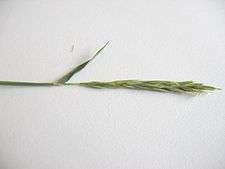Ähre
German

Die Ähre eines Grashalmes. — The head of a grass stalk. (2)
Etymology
From Old High German ahir, from Proto-Germanic *ahaz. Cognate with Dutch aar, English ear, West Frisian ier. Ultimately derived from Proto-Indo-European *h₂eḱ- (“sharp, pointed”).
Further Indo-European cognates: Latin aciēs (“edge”) and acus (“needle”), Ancient Greek ἄκρος (ákros), Russian острый (ostryj), Lithuanian ass (“sharp”), Tocharian B āk (“ear, awn”).
Pronunciation
- IPA(key): /ˈɛːʀə/
- Rhymes: -ɛːʀə
Audio (file)
Noun
Ähre f (genitive Ähre, plural Ähren, diminutive Ährchen n)
Declension
Hyponyms
- Korn n
Derived terms
- Ährenfeld n
- Ährenkranz m
- Ährenspindel f
- Scheinähre f
Further reading
- Ähre in Duden online
This article is issued from
Wiktionary.
The text is licensed under Creative
Commons - Attribution - Sharealike.
Additional terms may apply for the media files.
